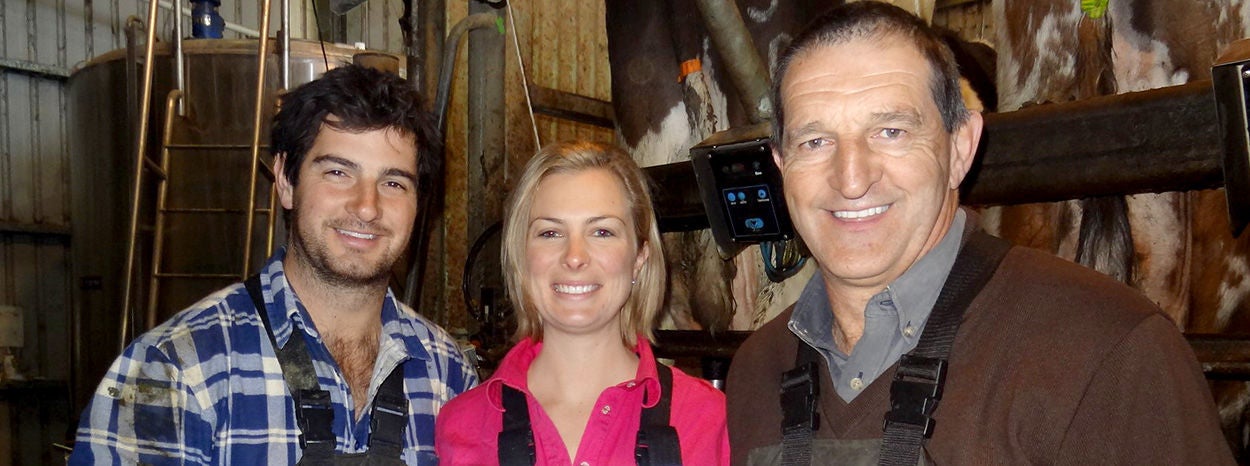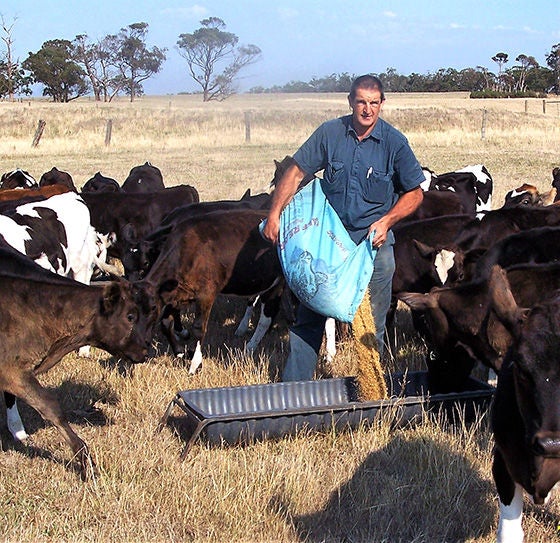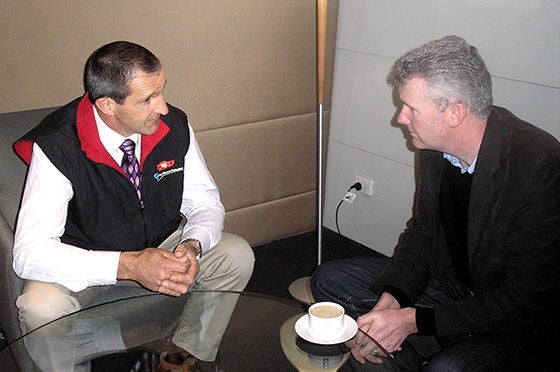Posted by on
29/05/2019
Their solutions were different, but Chris Griffin and his father both found ways to hand over the reins to the next generation – passing on a thriving dairy business along with a passion for ongoing expansion and efficiency.
The Griffin family’s love of dairy farming dates back to 1920 when Chris’ grandfather bought a 52 hectare dairy farm, “Springdale”, in Westbury, in the Gippsland region of Victoria.
Now, almost a century later, Chris’ son, Stuart, is at the helm of a dairy operation expanded to more than 230 hectares, where about 500 cows are milked in a once-a-day system.
Chris, who describes himself as semi-retired, is happy to leave the running of the business to Stuart, a qualified veterinarian who share farms the property with his wife Belinda.
“I know of a number of share farming situations where the parent has maintained control and not given the financial management authority to the share farmer. But I’ve relinquished all control to Stuart and basically now I just take orders off him, which is good.”
That easy transition of control from father to son is something that Chris has experienced before, when he and his wife Jan leased the farm from his father.
“I thought this was very courageous of my father. It had been his farm for the previous 50 years and he was able to relinquish control through the lease rather than share farming,” Chris said.
”This allowed me to make some mistakes, but also to learn without him saying anything really. He was a great help to me in those earlier years.”
Now the tables have turned, with Chris giving his support to Stuart.
Support too has been an important factor for Chris in the family’s relationship with Rabobank.
“The staff have a good understanding of our business and also the seasonal intricacies that we encounter, and our manager Russell Mann is excellent to work with. Also the national call centre is excellent on all aspects of the Rabobank business,” he said.

“With Rabobank, it’s not just ‘let’s look at the figures’, it’s ‘let’s look at the business’. They get an understanding of what you do, how you do it and why you do it.”
And the way they do it now, according to Chris, is that ‘Stuart looks after the business side, and I’m a bit of a Mr Fixit’.
That’s a combination that’s worked well, with the family focussed on maximising pasture growth and production efficiency.
“We’re very conscious of using grass as our major feed source. We harvest around 9 to 10 ton of pasture per hectare per year and that’s totally dryland. So it’s a real focus,” Chris said.
In fact, for the past 30 years Chris has been involved in a local discussion group where members divulge their financial costs each year to learn more about pasture production from one another.
Milking the benefits
Another important aspect for the business has been the switch to once-a-day milking introduced by Stuart two seasons ago. It’s a move that’s already starting to show benefits in terms of animal health, according to Chris.
“Because the cows aren’t travelling as much, we don’t get as many foot problems. Also the animals seem to be in better condition, so they conceive a lot better,” he said.
“The number of cows that don’t get pregnant in the 11 weeks we join for has dropped from 15-20% to below 10%. That gives us more choice as far as culling the animals at the end of the year.”
Stuart is also keen to start herd testing, with the extra cows allowing them to be more selective about who they sell and who they keep.
“We’ll probably get to a point where we can sell off the poorest 10% of the herd and, over the next five or so seasons, we should see a marked increase in our production levels. There are certainly cows better suited to the once-a-day system so if we can identify them, our rate of improvement would accelerate,” Chris said.
He also believes that there will be opportunities ahead for Stuart to expand their business through additional land purchases or long term leases.

Meeting the challenges
“I see a good future for dairy farming in our area and hopefully in Australia because dairy is a staple food for most of the community and we can produce it efficiently and at top quality. That’s what we aim to do on our farm and Stuart is following in those footsteps,” Chris added.
However, Chris acknowledges that ‘being on the land is always a challenge’.
“There’s never what you would call a perfect season. We can’t influence the weather and we can’t influence the price so what we have to do is work on the margin, making the margin between what we’re paid and what it costs us as wide possible,” Chris said.
“One year is never the same as the next so you have to reassess where you are every year. You can’t just run with the same recipe because that can be quite catastrophic.”
Despite the challenges, Chris admits that ‘dairy farming is in my blood’, so it’s no surprise he has put a lot of time and energy into helping the sector. He has previously served as the president of both United Dairyfarmers of Victoria and its national body, Australian Dairy Farmers.
Now he has turned his attention to his local community and this year joined Rabobank’s Client Council for Southern Victoria and Tasmania.
“This is a terrific thing that Rabobank does and we’re looking to do a few projects in our local area, like financial literacy workshops for the younger farmers,” Chris said.
